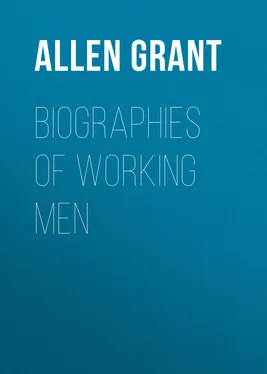Curiously enough, at the very time when George Stephenson was busy inventing his lamp at Killingworth, Sir Humphrey Davy was working at just the same matter in London; and the two lamps, though a little different in minor points of construction, are practically the same in general principle. Now, Sir Humphrey was then the great fashionable natural philosopher of the day, the favourite of London society, and the popular lecturer of the Royal Institution. His friends thought it a monstrous idea that his splendid life-saving apparatus should have been independently devised by "an engine-wright of Killingworth of the name of Stephenson—a person not even possessing a knowledge of the elements of chemistry." This sounds very odd reading at the present day, when the engine-wright of the name of Stephenson has altered the whole face of the world, while Davy is chiefly remembered as a meritorious and able chemist; but at the time, Stephenson's claim to the invention met with little courtesy from the great public of London, where a meeting was held on purpose to denounce his right to the credit of the invention. What the coal-owners and colliers of the North Country thought about the matter was sufficiently shown by their subscription of L1000, as a Stephenson testimonial fund. With part of the money, a silver tankard was presented to the deserving engine-wright, while the remainder of the sum was handed over to him in ready cash. A very acceptable present it was, and one which George Stephenson remembered with pride down to his dying day. The Geordie lamp continues in use to the present moment in the Tyneside collieries with excellent effect.
For some years more, Mr. Stephenson (he is now fairly entitled to that respectable prefix) went on still further experimenting on the question of locomotives and railways. He was now beginning to learn that much unnecessary wear and tear arose on the short lines of rail down from the pit's mouths to the loading-places on the river by the inequalities and roughnesses of the joints; and he invented a method of overlapping the rails which quite got over this source of loss—loss of speed, loss of power, and loss of material at once. It was in 1819 that he laid down his first considerable piece of road, the Hetton railway. The owners of a colliery at the village of Hetton, in Durham, determined to replace their waggon road by a locomotive line; and they invited the now locally famous Killingworth engine-wright to act as their engineer. Stephenson gladly undertook the post; and he laid down a railway of eight miles in length, on the larger part of which the trucks were to be drawn by "the iron horse," as people now began to style the altered and improved locomotive. The Hetton railway was opened in 1822, and the assembled crowd were delighted at beholding a single engine draw seventeen loaded trucks after it, at the extraordinary rate of four miles an hour—nearly as fast as a man could walk. Whence it may be gathered that Stephenson's ideas upon the question of speed were still on a very humble scale indeed.
Before the Hetton railway was opened, however, George Stephenson had shown one more proof of his excellence as a father by sending his boy Robert, now nineteen, to Edinburgh University. It was a serious expense for a man who was even now, after all, hardly more than a working man of the superior grade; but George Stephenson was well repaid for the sacrifice he thus made on behalf of his only son. He lived to see him the greatest practical engineer of his own time, and to feel that his success was in large measure due to the wider and more accurate scientific training the lad had received from his Edinburgh teachers.
In 1819 George married again, his second wife being the daughter of a farmer at Black Callerton.
Конец ознакомительного фрагмента.
Текст предоставлен ООО «ЛитРес».
Прочитайте эту книгу целиком, на ЛитРес.
Безопасно оплатить книгу можно банковской картой Visa, MasterCard, Maestro, со счета мобильного телефона, с платежного терминала, в салоне МТС или Связной, через PayPal, WebMoney, Яндекс.Деньги, QIWI Кошелек, бонусными картами или другим удобным Вам способом.












